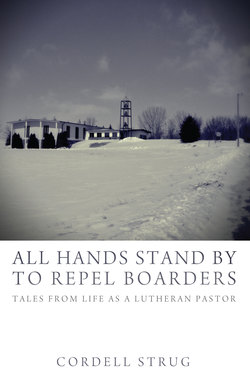Читать книгу All Hands Stand By to Repel Boarders - Cordell Strug - Страница 15
На сайте Литреса книга снята с продажи.
Hanging Out
ОглавлениеYou have to love the basic rhythm of church life, the inexorable, unstoppable turning of every week toward Sunday, when, ready or not, you have to bring what you have for everybody to receive. I went into every Sunday energized, stomach turning over, anxious to start, riding that performer’s wave of aspiration. I was jittery with nerves until I could enter the service and have it carry me along. Every Sunday was like opening night: it could make you so sick it would be easy to hate it if you didn’t love it.
But all around that great moment and that basic rhythm were the sloppier rhythms of ordinary life in a small town parish: the people you see every day in town, the shut-ins you visit, the classes and the meetings, the people going in and out of medical care, the people in nursing homes who are never coming out. The years pass and you bury, baptize, teach, and marry generation after generation in the same families. You have to love that, too.
In grad school, we were members of a university church and the turnover of members was constant. The handful of funerals that occurred during our years there were shattering experiences for that gathering of the young and vibrant. But, during our service as pastors, funerals were a defining mark of the communities we served in, a clearly visible, ever present stage on life’s way. When we buried the old ones, children would be taken down the hall of confirmation pictures to see their grandfathers and grandmothers in their confirmation robes.
One long winter, I was reading Siegfried Sassoon’s fictionalized memoirs of his service as an infantry officer in World War I, and it struck me that life in a small town parish had some similarities: nobody’s winning anything; nobody’s going anywhere—in fact, you feel guilty when you leave; all you can do is keep the life you have going with as much courage and humor as you can summon up; when there’s a change, it’s usually brought by death.
(During one of the worst winters, I started to see myself as something like a junior officer in the doomed German sixth army at Stalingrad: in a trap like that, it made no difference what you knew or what you did; you had simply come to a time and place where you were going to lose. I can remember coming up with that comparison as I trudged to the post office in a howling blizzard, but I’m thankfully distant from the depression that must have spawned it.)
And yet I generally enjoyed that weekly, yearly round within the lifetimes of the people who happened to be living at the time and in the place where I happened to be serving.
I had my own personal rhythms my life moved to, as well. It’s amusing to look back and realize that in such a public, exposed life, I tended to begin and end each week in absolute solitude. Since every week moved to the Sunday service, I worked hard to keep Saturday night clear. I wanted to get into a tunnel where all I could see were the details of the things to be done next day. (This became such a habit that I still get nervous leaving the house on Saturday night.) The more commitments I had on Sunday the more isolated I wanted to be the night before.
Then, the more things I had done on Sunday the more catatonic I was on Monday morning. I would sit over my coffee, trying to remember what it felt like to be interested in anything.
But it’s the regular, gentle drifting along with the lives of others that I want to celebrate here and that I think is so important in parish life.
I was standing, one day, with a pair of young funeral directors, John and Joe. They were the last two in a series of fine funeral directors I was thankful to work with. The three of us would often be, except for a couple of ladies in the kitchen, the first to arrive at a funeral. I needed to check everything not only well before the service but well before any mourners arrived. I had nothing but contempt for leaders who weren’t prepared and it was a pleasure to work with people who thought the same.
John and Joe always treated the presiding ministers to lunch after we were set up. Then we would stroll back to the church to deal with anything that came up; but, mostly, if things were going smoothly, we would talk to the mourners and hang out together.
I was standing there with them, enjoying the comfortable way we worked together, feeling good about all the people that had turned out for the service, seeing such a big part of the community flowing together for this moment, and that was when I had this reflection: if someone asked me what you needed, if you were going to thrive as a pastor, I think I would say that, after you reach a certain level of competence with the standard qualifications, there’s one quality you have to have. You have to be able, sometimes, to do nothing much but hang out.
